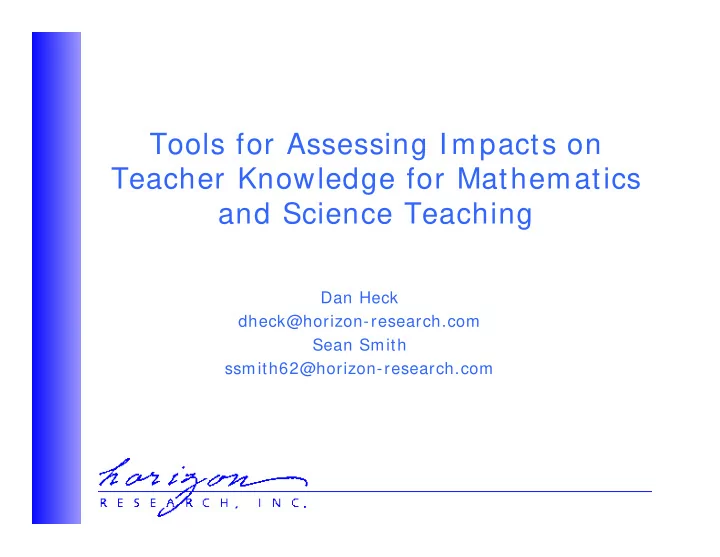

Tools for Assessing Impacts on Teacher Knowledge for Mathematics and Science Teaching Dan Heck dheck@horizon-research.com Sean Smith ssmith62@horizon-research.com
Existing Tools: Science
Diagnostic Teacher Assessments in Mathematics and Science • Assessments in life, earth, and physical science (one in each area) • Knowledge domains: – declarative knowledge – scientific inquiry and procedures – schematic knowledge – pedagogical content knowledge (PCK) – science, technology, and society knowledge • Each form has 20 multiple choice and 5 open-ended • Straight content (except for PCK) • Available on fee basis; $7 per teacher for scoring • Contact Bill Bush at U of L: bill.bush@louisville.edu http: / / louisville.edu/ edu/ crmstd/ diag_sci_assess_middle_teachers.html
Sample Multiple Choice Item
If a constant net force greater than zero is applied to a ball, what would you observe? A. Not much, because a “net” force is always weak. B. The ball will go at a constant speed in a straight line. C. The ball speeds up, slows down, or changes direction. D. The ball will eventually explode or disintegrate.
Sample Open-ended Item
After a lab that involved magnetism and compasses, a student writes that a magnet can’t function on the Moon because there are no magnetic poles on the Moon as there are on Earth. Identify this student’s misconception and describe an appropriate strategy to counteract this misconception.
MOSART: Misconception Oriented Standards-based Assessment Resource for Teachers (NSF Grant No. 0412382) • Probes for conceptual shift(s) resulting from professional development or course work • Distractors based on published misconceptions • Each test is 20 m-c items • Same tests for teachers and students • Available at no cost • Contact Phil Sadler http: / / www.cfa.harvard.edu/ smgphp/ mosart/ about_mosart.html
Sample Item
Sue sticks one end of a metal rod into a box filled with ice. The end of the rod that is covered with ice becomes cold. After a while Sue places her hand on the upper end of the rod outside the box and feels that it is cold. What do you think has happened? a. Cold has transferred from the lower end of the rod to the upper end. b. The rod gave up heat to the ice. c. Cold moved from Sue’s hands towards the rod. d. Heat moved from the rod to Sue’s hand. e. It depends on the original temperature of the rod.
ATLAST Assessing Teacher Learning About Science Teaching (NSF Grant No. 0335328)
Common Features of All Items • All are multiple choice • All are keyed to a specific sub-idea • All are set in the context of work that teachers do
Sample Item
Level 2 Item Features • Address teachers’ ability to analyze student thinking using science content knowledge • Cannot be answered without content knowledge • Only one answer choice is “content- correct” and relevant to the instructional context • Fairly high cognitive load
Common Errors Made With Level 2 Items • Teachers look for common student thinking rather than the thinking of these students • Teachers look for a correct statement • Teachers try to answer the student item • Teachers look for familiar wording – e.g., “equal and opposite” • Teachers need options that allow them to hold naïve conceptions
Sample Item
Level 3 Item Features • Address teachers’ ability to make instructional decisions using science content knowledge • Cannot be answered without content knowledge • Only one answer choice is “content- correct” and relevant to the instructional context • High cognitive load
Common Errors Made With Level 3 Items • Teachers see all activities/ questions as “best” – Lack of content knowledge – High cognitive load • Context is important – Focus on logistics – Unfamiliar scenario/ equipment • Teacher beliefs
Types of Items • Knowledge of science content • Using science content knowledge to analyze student thinking • Using content knowledge to make instructional decisions
Pros and Cons • Pros – Rigorously developed – Strong validity – Minimally burdensome – No cost • Cons – Narrowly focused(?) – Only three assessments
Recommend
More recommend